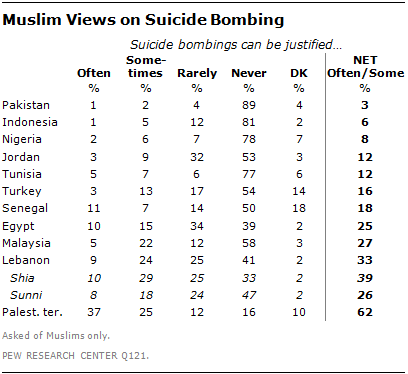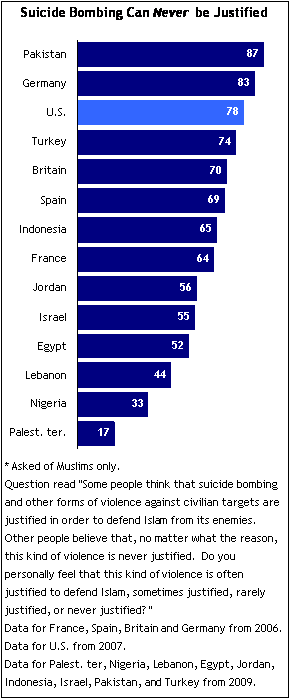The weekly report on research and demographics of the secular movement
by Julie Esris
Two Muslim extremists, Elton Simpson and Nadir Soofi, opened fire at the Mohammed Art Exhibit Cartoon Contest in North Garland, Texas on Monday. The contest allowed cartoonists to submit drawings of Mohammed for a chance to win $10,000. Depicting Mohammed in any way is considered blasphemous by many Muslims, and doing so is also a constructive way to challenge a fierce taboo. However, it is also very dangerous, as it is what motivated the two men. The gunmen injured a security guard, but nobody else was harmed. Police intervened and killed both Simpson and Soofi. Simpson is thought to have ties to ISIS, as evidenced by a Tweet in which he pledges loyalty to ISIS leader Abu Bakr al Baghdadi.
This is the latest in a string of events in which Muslim extremists have violently retaliated against slights to the Muslim faith. Another recent violent act by Muslim extremistsÔÇöwhich also was in protest of depictions of MohammadÔÇö was the attack in France in which brothers Sa├»d and Ch├®rif Kouachi opened fire on the office that publishes the satirical magazine Charlie Hebdo, killing eleven people and wounding eleven others. But just how many Muslims support this kind of violence? How many support the actions of Muslim extremists? A 2013 Pew Poll asked 8,989 Muslims in Southeast Asia, the Middle East, and sub-Saharan Africa whether or not they support violence in the name of Islam.
Clear majorities of Muslims surveyed are against any kind of violence used to defend Islam. Of Muslims surveyed, 89% in Pakistan, 81% in Indonesia,78% in Nigeria, and 77% in Tunisia believe that suicide bombings or other violent acts which target civilians are never justified. A 2009 Pew Poll of Muslim Americans indicates that 78% believe that suicide bombing and other civilian-targeted violence is never justifiable. The aforementioned 2013 poll reveals that a majority of Palestinian Muslims (62%) believes that suicide bombing is sometimes justifiable, most likely because of the never-ending wars between Palestine and Israel. However, support for violence in the name of Islam has generally declined.
It is encouraging to learn that the fringe minority of Muslim extremists and their supporters are indeed a (most likely) fringe minority. However, it is frightening to look at just how large the minority is. Even in the United States, where Muslims are more likely to be exposed to secular culture and other religions, only 78% believe that suicide bombing and other forms of violence against civilians to defend Islam is never justifiable. That means that 22% believe that it is sometimes justifiable. However, it is important to note the nebulousness of this question, which ultimately asked if violence of any kind in defense of Islam could ever be justified. The polls do not ask under what circumstances such violence is acceptable, nor does it define what it means to defend Islam. A more accurate poll would ask if violence is necessary in specific instances. For example, is violence justified when someone draws Mohammed? Is violence justified when a group of people attacks your community and you fear that if you donÔÇÖt retaliate that your community will be annihilated? Such questions would give a better picture of just how many Muslims do support extremist behaviors.
On the other hand, the 2009 poll of Muslim Americans indicated that 7% believe that suicide bombing specifically is justifiable at least some circumstances. Unlike other forms of violence, which could theoretically be retaliation against violent attacks, the promise of a martyrÔÇÖs heaven is a large part of a suicide bomberÔÇÖs motive and clearly has nothing to do with self-defense. As Richard Dawkins notes in The God Delusion, it is a firm adherence to their faith that gave the Muslim 9/11 hijackers to execute their attack as a suicide mission. Unfortunately, the 2013 poll, which surveyed Muslims outside of the United States, did not ask respondents separate questions about suicide bombing and violence in general.
It is encouraging to see that the Muslim extremism is declining, possibly due to the Internet. Muslims in countries dominated by Sharia law are sometimes able to learn about other ideas through the Internet and thus change their views, or at least broaden their horizons. In fact, another Pew poll conducted in 2013 indicates that Muslim Internet use is correlated with favorable views of Western culture even when controlling for age, gender, level of religious observance, and participation in interfaith activities. The poll indicates that Internet users still view Islam as the only path to heaven, and it does not indicate one way or another if Internet use impacts MuslimsÔÇÖ views on extremism in the name of Islam. However, if Internet use correlates with favorable views of Western culture, it seems unlikely that these people would support religious extremism. Perhaps the Internet is the key to reducing Muslim extremismÔÇöand extremism of any kind.
